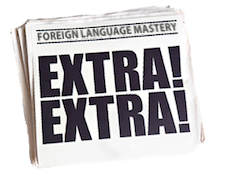A NOT To Do List for Successful Language Learners
To do lists seem like a good idea in theory, but they have one major disadvantage: there is an infinite number of potential to do items. With this in mind, Timothy Ferriss, best-selling author of The 4-Hour Workweek (and a speaker of 6 languages), recommends "not to do lists" instead. Since they isolate a finite set of behaviors that are getting between you and your goals, they are far more effective than traditional to do lists. This tool applies perfectly to language learning, where most learners waste a lot of time on ineffective methods, bad materials, and counter-productive attitudes.
read moreWhy Most Fail in Language Learning and How YOU Can Succeed
This is the complete version of a shorter presentation I entered in the "Fuze Tell a Story Contest." It expands much more on: 1) Why most learners fail to learn foreign languages depsite years of effort. 2) Tips on fostering the right attitude for successful language learning. 3) Advice on what materials to use for maximum efficacy and efficiency.
read more10 Things Your Language School Doesn’t Want You to Know
Language schools can be a wonderful place to learn more about your target language, meet fellow learners (who can become both study partners or even lifelong friends), and get your linguistic and cultural feet wet before (or even while) immersing yourself in a new culture and foreign tongue. However, language schools can also be a major impediment to the very goal you go there to achieve: learning a foreign language as quickly and efficiently as possible. This may come as a shock to those who have been conditioned to believe that classrooms are the only place, or at least the best place, to learn a language. Read on to see the top ten disadvantages of formal, classroom-based language learning.
read moreThe Critical Difference Between “Studying” and “Learning” a Language
I am often asked if there any tricks or shortcuts to learning a language more quickly. I always respond with the same answer: "The trick to learning a language is to actually learn the language." This may sound obvious, but it points to the fundamental (and so often under-appreciated) reason why most adults fail to learn a foreign language no matter how many years they sit in a classroom or live where the language is spoken: Most adult learners spend nearly all of their study time reading and learning about their target language, with very little time truly listening to or reading in the language.
read moreWant a Dream Resume? Learn a New Language
More and more, it is becoming extremely beneficial to know a foreign language in today's tough job market. Any kind of edge helps now more than ever in this economy, and one of the most sought-after and respected skills that can give you the upper hand is knowing a foreign language. Having expertise in another language only opens up more doors and opportunities -- and offers more perks at those jobs. If you need more convincing, read on for these reasons why a second language will positively impact your career...
read moreThe Input vs. Output Debate: John’s 2¢
As a language learning addict, I follow lots (and I mean lots) of polyglot blogs and podcasts. It is always interesting to see what has worked (and what hasn't worked) for successful language learners. While most fluent foreign language speakers tend to agree on the vast majority of language learning DOs and DON'Ts, there is one area that always seems to cause heated debate, shouting, name calling, and occasional mud/poo flinging: the importance of language input (i.e. listening and reading) versus language output (i.e. speaking and writing). I have sat quietly on the sidelines for some time now, politely listening to both sides of the argument. But it's time to blow my referee whistle because both teams are "offsides" (Okay John, enough sports analogies already!)
read more








 25% off Master Japanese: Self-Guided Immersion for the Passionate Language Learner.
25% off Master Japanese: Self-Guided Immersion for the Passionate Language Learner.
